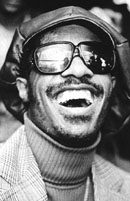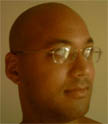Stevie Wonder
.jpg)
"Stevie Wonder’s place in history will surely reflect his enormous accomplishments in the music industry: his more than 30 records that have sold more than 70 million copies, his smash hits that place him in the company of only the Beatles and Elvis Presley on the list of the most top-ten records, his 17 Grammy Awards, and his Oscar.
But this ability to sing, write, perform, and speak are simply his tools. The measure of Stevie Wonder’s greatness is not that he possesses these tools. What makes him so extraordinary, so inspiring, so king-like, is the way in which he has chosen to utilize his talents.
Stevie Wonder has used his enormous gifts to help us move toward the promised land. He was a valiant warrior against South African Apartheid, perhaps the greatest example in our lifetime about the power of dreams and moral fortitude. He has used his gifts to work passionately against world hunger, against nuclear proliferation, and toward racial harmony. And of great significance today, it was Stevie Wonder who energized the campaign that led Congress to create a national holiday in honor of Dr. King and his life’s work."
Excerpted from the introduction made by Lawrence Marshall, Professor of Law, Northwestern University Law School. Stevie Wonder delivered the keynote address for the Martin Luther King Day Celebration at Northwestern's Law School on January 20, 2003.

Stevie Wonder was born Steveland Hardaway Judkins on May 13, 1950, in Saginaw, Michigan. He prefers to be known as Steveland Morris after his mother's married name.
What makes Stevie Wonder unique compared to other musicians is that he is blind. It is said that immediately after his birth when he was placed in an incubator, and given too much oxygen, which, in combination with his affliction with Retinopathy of Pre-maturity (R.O.P.), blinded him for life.
Born premature, blood vessels in the back of the eye had not reached the front of the eye, temporarily halted, then branched out wildly into the Vitreous of the eye. The end result caused scar tissue to pull at the retina eventually causing the retina to detach.
He learned at a young age that he had a talent for music. Despite his blindness, he began to learn the piano at the age of seven, and by the time he was nine, he had mastered the drums and harmonica.
He taught himself how to play through a Braille book because his family couldn't afford an instructor. After his family moved to Detroit in 1954, Steveland joined a church choir, the gospel leanings on his music balanced by the R & B of Ray Charles and Sam Cooke.
In 1961, he was discovered by Ronnie White of the Miracles, who arranged an audition at Motown Records. Berry Gordy immediately signed Steveland to the label. Stevie was an instant superstar and his first album went platinum. His blend of blues, African and reggae vibes was unprecedented and he attracted millions of fans. His manager said that when Stevie received word that his opening album went platinum, he fainted. He was so motivated to provide entertainment for people that he incorporated two new instruments into his act, the drums and the harmonica.
Clarence Paul came up with the 'Wonder' surname stating that 'We can't keep introducing him as the '8th Wonder Of The World'. Wonder was placed in the care of writer / producer Clarence Paul, who supervised his early recordings. These helped him develop his talents as a multi-instrumentalist, but did not indicate a clear musical direction.
In 1963, the release of the live recording 'Fingertips' established his commercial success, and Motown quickly marketed him on a series of albums as 'the 12-year-old genius' in an attempt to link him with the popularity of 'the late genius', Ray Charles.
Attempts to repeat the success of 'Fingertips' proved difficult, and Wonder's career was placed on hold during 1964 while his voice was breaking.
He re-emerged in 1965 with a sound that was much closer to the Motown mainstream, achieving a worldwide hit with 'Uptight (Everything's Alright)', which he co-wrote with Henry 'Hank' Cosby and Sylvia Moy. This began a run of U.S. Top 40 hits that continued unbroken (apart from seasonal Christmas releases) for over six years.
From 1965-70, Stevie Wonder was marketed like the other major Motown stars, recording material that was chosen for him by the label's executives, and issuing albums that mixed conventional soul compositions with pop standards.

Stevie also recorded his versions of Bob Dylan's 'Blowin ln The Wind' and Ron Miller's 'A Place In The Sun' in 1966.
He co-wrote almost all of his singles from 1967 onwards, and also began to collaborate on releases by other Motown artists, most notably co-writing Smokey Robinson And The Miracles' hit 'The Tears Of A Clown', and writing and producing the (Motown) Spinners' 'It's A Shame'.
During this time, Stevie helped with the Civil Rights Movement. He was good friends and a huge supporter of Martin Luther King, Jr. In 1980, he performed the song, "Happy Birthday," for the first time on Martin Luther King, Jr. Day. He was honored at the services by the president.
His contract with Motown expired in 1971, rather than re-signing immediately, as the label expected, Wonder financed the recording of two albums of his own material, playing almost all the instruments himself, and experimenting for the first time with more ambitious musical forms.
He pioneered the use of the synthesizer in Black Music, and also broadened his lyrical concerns to encompass racial problems and spiritual questions.
Wonder then used these recordings as a lever to persuade Motown to offer a more open contract, which gave him total artistic control over his music, plus the opportunity to hold the rights to the music publishing with his own company, Black Bull Music.
The signing of the contract with the release of the solo recordings 'Where I'm Coming' From and 'Music Of My Mind', which, despite lukewarm critical reaction, quickly established him at the forefront of black music.
'Talking Book', in 1972, combined the technological advances of recent albums with major commercial success, producing hit singles from the driving 'Superstition', to the ballad standard 'You Are The Sunshine Of My Life'.
Wonder married fellow Motown artist Syreeta on 14th September 1970; he premiered many of his new production techniques on 'Syreeta' (1972) and 'Stevie Wonder Presents Syreeta' (1974), for which he also wrote most of the material.
'Innervisions' (1973) consolidated the growth and success of 'Talking Book', bringing further hit singles with the socially aware 'Living For The City' and 'Higher Ground'.
Later that year, Stevie was seriously injured in a car accident.
The release of 'Fulfillingness First Finale' in 1974 epitomized a more thoughtful approach.
The double album 'Songs In The Key Of Life', in 1976, was widely greeted as his most ambitious and satisfying work to date.

It demonstrated a mastery and variety of musical forms and instruments, offering a tribute to Duke Ellington on 'Sir Duke', and paying tribute to major black figures on 'Black Man'.
Surprisingly, after this enormous success, no new recordings surfaced for over three years, as Wonder concentrated on perfecting the soundtrack music to the documentary film 'The Secret Life Of Plants'.
This primarily instrumental double album was greeted with disappointing reviews and sales.
Stevie quickly delivered the highly successful, 'Hotter Than July' in 1980, which included a tribute song to the late Dr. Martin Luther King, 'Happy Birthday', and 'All I Do'.
After compiling the retrospective double album 'Stevie Wonder's Original Musiquarium' in 1982, which included four new recordings (including 'Do I Do' and 'Ribbon In The Sky') alongside the cream of his post-1971 work, Stevie scheduled an album entitled 'People Move Human Play' in 1983.
This never appeared, instead, he composed the soundtrack music for the film 'The Woman In Red', which oddly included his biggest-selling single to date, the sugary ballad, 'I Just Called To Say I Loved You'.
The album on which he had been working since 1980 eventually appeared in 1985 as 'In Square Circle'.
His status as an elder statesman of bIack music, and as a champion of black rights, was boosted by his campaign in the early 80's to have the birthday of Dr. Martin Luther King celebrated as a national holiday in the U.S.A.
This request was granted by the late President Reagan, and the first Martin Luther King Day was celebrated on 15th January 1986 with a concert at which Wonder topped the bill.
Like his next project, 'Characters', in 1987, the album represented a return to the accessible, melodic music of the previous decade.
Stevie was then inducted into the Rock And Roll Hall Of Fame in 1989.
Stevie has been generous in offering his services as a writer, producer, singer and musician to other performers.
His most public collaborations included work with Paul McCartney, which produced the hit, 'Ebony And Ivory', Gary Byrd, Michael Jackson and the Eurythmics, and on the benefit records by U.S.A. For Africa and Dionne Warwick & Friends.
'Conversation Peace' in 1995 was an album with good songs and had some success.

On the 3rd of December 1999 a story appeared from Reuters which read:
'American pop superstar Stevie Wonder told fellow worshippers at a church service in Detroit December 2 that he is to undergo an operation that would enable him to see again. Wonder hopes to have the operation, which involves the insertion of a microchip in his eye, at Baltimore's John Hopkins University's Wilmer Eye Institute.'
His songs can be heard on Spike Lee's movie 'Bamboozled, entitled 'Misrepresented People' and 'Some Years Ago' and represented a return to Stevie's political comment.
Stevie Wonder re-married, in 2001, to a woman named Karen.
After the September 11th disaster that year, he recorded with the group Take 6 on a version of 'Love's In Need Of Love Today', dedicated to those who passed away that day.
Stevie returned to recording in 2005 with the album 'A Time 2 Love'. A single entitled 'So What The Fuss' was released prior to the album. He also appeared at the Live 8 U.S. concert in 2005, where he paid his respect to the late Luther Vandross whose funeral he performed at.



0 Comments:
Post a Comment
<< Home